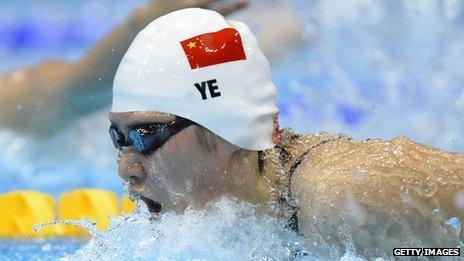Why teen athletes can make big improvements
- Published

Ye Shiwen swam faster in the last 50m of the 400m medley than her counterpart in the men's race
Outside of the performance of Team GB athletes, perhaps the abiding image of the Olympics so far is the performance of Ye Shiwen.
The 16-year-old Chinese swimmer claimed gold on Saturday in the 400m individual medley, in a world record time of four minutes 28.43 seconds.
At the 300m mark, she was eight-tenths of a second behind the leader, US swimmer Elizabeth Beisel.
But by the end of an astonishing freestyle leg, she was almost three seconds ahead of her.
Her final 50m was faster than Ryan Lochte's in the men's event, despite him swimming one of the fastest times in history.
US coach John Leonard, executive director of the World Swimming Coaches Association, has questioned the performance, saying it was "suspicious".
'Sour grapes'
However, she has denied any wrongdoing. It should also be pointed out that she has been tested at the Olympics and previously and has never failed a drugs test.
And other experts have said the doubts that have been cast over her win are just "sour grapes".
They say it is perfectly possible to see dramatic improvements in teenage competitors.
Ye's time on Saturday was seven seconds faster than the one she clocked at last year's world championships.
And she is not the only young swimmer who has made big strides in these Games.
Ruta Meilutyte, a 15-year-old from Lithuania, took gold in the 100m breaststroke.
Her best time at the Olympics - clocked in the semi-final - was 2.5 seconds faster than her time at the European Youth Olympics a year ago.
And her event is four times shorter than Ye's.
Australian Ian Thorpe, who has won five Olympic golds, says the way the body develops during the teenage years makes such feats possible.
He says from the age of 15 to 16, his personal best in the 400m freestyle improved by five seconds, allowing him to take the world record.
"Young swimmers can take chunks off chunks of time that others can't," he adds.
Adrian Moorhouse, the British swimmer who took gold in the 100m breaststroke at the 1988 Olympics in Seoul, makes the same point.
When he was 17, he bettered his personal best by four seconds, explaining it was a "natural growth spurt".
He says Ye's "small and light" frame is a great physique for her event.
"They might have just found this really, really talented kid who can work really, really hard, and actually got the perfect shape and actually can cope with all the pressure that's thrown at her."
'Development'
So how does the teenage body change to allow big improvements?
Prof John Brewer, director of sport at Bedfordshire University and member of the British Olympic Association, says during these years the body releases hormones which help the body grow, muscle bulk develop and powers of endurance increase.
"In a short space of time the body can undergo massive changes," he says.
"During this [period] the performance of young athletes can sometimes suffer, but in the end it results in a body that is capable of much higher performance."
Prof John Brewer also believes there may be something about the nature of swimming that makes it easier for young athletes to excel.
"It is about power and endurance, meaning that young swimmers are able to train harder and longer at a younger age compared to something like sprinting, which is much more about power.
"It means we can see swimmers mature at an earlier stage."
Professor Craig Williams, an expert in health and exercise at Exeter University, who has worked with youth athletes, agrees.
"Sports such as gymnastics and swimming are technically demanding and so with the correct training youngsters can excel even if they are not the most powerful."
But he says the improvements in performance are also related to maturing mentally as well as physically.
"Obviously the changes in the body help in terms of strength and endurance, but the psychological aspect is important too.
"You have to be able to handle the pressure and know how to perform. That can make a big difference."
But Ye's performance can be explained by something much more basic too.
It is something many commentators have highlighted - the size of Ye's home country's population.
"China has a vast pool of talent to choose from... so we should not be too surprised when an individual with exceptional talent emerges," Prof Brewer adds.
- Published31 July 2012
- Published31 July 2012
- Published31 July 2012
- Published31 July 2012
- Published31 July 2012